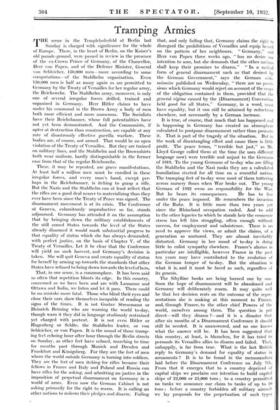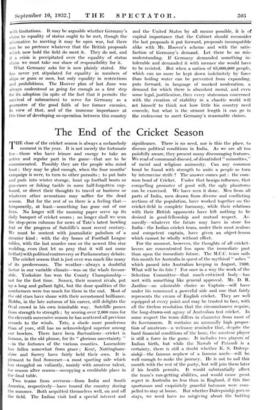Tramping Armies
THE scene in the Templehoferfeld at Berlin last Sunday is charged with significance for the whole of Europe. There, in the heart of Berlin, on the Kaiser's old parade-ground, were passed in review in the presence of the ex-Crown Prince of Germany, of the Chancellor, Herr von Papen, and of the Defence Minister, General von Schleicher, 150,000 men—more according to some computations—of the Stahlhelm organization. Even 150,000 men is half as many again as are permitted to Germany by the Treaty of Versailles for her regular army, the Reichswehr. The Stahlhelm army, moreover, is only one of several irregular forces drilled, trained and. organized in Germany. Herr Hitler claims to have under his command in the Brown Army a body of men both more efficient and more numerous. The Socialists have their Reichsbanner, whose full potentialities have not yet been demonstrated. And the Communists, if apter at destruction than construction, are capable at any rate of disastrously effective guerilla warfare. These bodies are, of course, not armed. That would be an open violation of the Treaty of Versailles. But they are trained on military lines, and the Stahlhelm and the Brownshirts both wear uniform, hardly distinguishable in the former case from that of the regular Reichswehr.
These, it may be repeated, are grave manifestations. At least half a miflion men must be enrolled in these irregular forces, and every man's hand, except per- haps in the Reichsbanner, is itching to grasp a rifle. But the Nazis and the Stahlhelm can at least reflect that the rifles are a good deal nearer to materializing than they ever have been since the Treaty of Peace was signed. The disarmament movement is at its crisis. The Conference at Geneva, calamitously unproductive so far, stands adjourned. Germany has attended it on the assumption that by bringing down the military establishments of the still armed States towards the level of the States already disarmed it would mark substantial progress to that equality of status which she has always demanded, with perfect justice, on the basis of Chapter V. of the Treaty of Versailles. Let it be clear that the Conference will yield no such harvest, and Germany's decision is taken. She will quit Geneva and create equality of status for herself by arming up towards the standards that other States have refused to bring down towards the level of hers.
That, in one sense, is a commonplace. It has been said so often that repetition blunts its edge. In this country, concerned as we have been and are with Lausanne and Ottawa and India, we listen and let it pass. There could be no mistake more fatal. Those who blind their eyes and close their ears show themselves incapable of reading the signs of the times. It is not Gustav Stresemann or Heinrich Bruning who are warning the world to-day, though warn it they did in language studiously restrained yet charged with portent. It is not even Hitler or Hugenberg or Seldte, the Stahlhelm leader, or von Schleicher, or von Papen. It is the sound of those tramp- ing feet echoing hour after hour through the Berlin streets on Sunday, as other feet have echoed, marching to time for months past through Munich and Dresden and Frankfurt and Konigsberg. For they are the feet of men whom the world outside Germany is turning into soldiers. They are the feet of men itching for rifles because their fellows in France and Italy and Poland and Russia can have rifles for the asking, and admitting no justice in the imposition of perpetual disarmament on Germany in a world of arms. Even now the German Cabinet is not asking primarily for the right to rearm. It is calling on other nations to redeem their pledges and disarm. Failing that, and only failing that, Germany claims the right to disregard the prohibitions of Versailles and equip herself on the pattern of her neighbours. "Germany," said Herr von Papen three weeks ago, "has no desire nor intention to arm, but she demands that the other nations shall keep their promises to disarm." " In a radical form of general disarmament such as that desired by the German Government," says the German aide- memoire published on Wednesday, "there are no provi- sions which Germany would reject on account of the scope of the obligation contained in them, provided that the general regime caused by the (Disarmament) Convention held good for all States." Germany, in a word, must have equality, but it can still be attained by reductions elsewhere, not necessarily by a German increase.
It is true, of course, that much that has happened and is happening in Germany has created an atmosphere calculated to postpone disarmament rather than promote it. That is part of the tragedy of the situation. But in the work of disentangling effect and cause there is little profit. The peace terms, "terrible but just," as Mr. Lloyd George called them at the time (he uses different language now) were terrible and unjust to the Germans of 1919. To the young Germans of to-day who are filling the Stahlhelm and the Nazi ranks they are a calculated humiliation riveted for all time on a resentful nation. The tramping feet of to-day were most of them tottering across nursery floors when War broke out. The young German of 1932 owns no responsibility for the War.
But he bears its consequences. He has to live under the peace imposed. He remembers the invasion of the Ruhr. It is little more than two years yet since the Rhineland occupation ended. And to add to the other legacies to which he stands heir the economic stress has left him struggling, often enough without success, for employment and subsistence. There is no need to approve the views, or admit the claims, of a generation so nurtured. They are almost inevitably distorted. Germany in her mood of to-day is doing little to enlist sympathy elsewhere. France's alarms in particular are intelligible, however France in the past ten years may have contributed to the evolution of the German temper of to-day. But the situation is what it is, and it must be faced as such, regardless of its genesis.
The Sibylline books are being burned one by one. Soon the hope of disarmament will be abandoned and Germany will deliberately rearm. It may quite well be that her decision rests on the outcome of the repre- sentations she is making at this moment to France, and, through France, to the other chief Powers of the world, ourselves among them. The question is put direct—will they disarm ?—and it is a disaster that after six months of a Disarmament Conference it should still be needed. It is unanswered, and no one knows what the answer will be. It has been suggested that . this country, at least, is blameless, for it has tried to persuade its Versailles allies to disarm and failed. That, unhappily, is far from true. What is the last British reply to Germany's demand for equality of status in armaments ? It is to be found in the memorandum laid before the Disarmament Conference on July 7th. From that it emerges that to a country deprived of capital ships we proclaim our intention to build capital ships of 22,000 or 25,000 tons ; to a country permitted no tanks we announce our claim to tanks of up to 20 tons ; before a country forbidden all military, aircraft we lay proposals for the perpetuation of such types with limitations. It may be arguable whether Germany's claim to equality of status ought to be met, though the alternative to meeting it may be open war, but there can be no pretence whatever that the British proposals which now hold the field do meet it. They do not, and if a crisis is precipitated over the equality of status claim we must take our share of responsibility for it.
What Germany asks for is now plainly stated. She has never yet stipulated for equality in numbers of ships or guns or men, but only equality in restrictions and prohibitions. The Hoover plan of last June was always understood as going far enough as a first step for its adoption (in spite of the fact that it permits the survival of submarines) to serve for Germany as a guarantee of the good faith of her former enemies. In view of that, and of the immense importance at this time of developing co-operation between this country and the United States by all means possible, it is of capital importance that the Cabinet should reconsider the last proposals it put forward, proposals incompatible alike with Mr. Hoover's scheme and with the satis- faction of Germany's demand. Let there be no mis- understanding. If Germany demanded something in- tolerable and demanded it with menace she would have to be resisted. But when a nation of 65,000,000 people, which can no more be kept down indefinitely by force than boiling water can be prevented from expanding, puts forward, in language of marked moderation, a demand for which there is abundant moral, and even some legal, justification, then every statesman concerned with the creation of stability in a chaotic world will set himself to think not how little his country need concede, but what is the utmost length it can go in the endeavour to meet Germany's reasonable claims.































 Previous page
Previous page